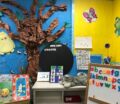
For those of us in the field of education, August can hit us with a mix of emotions. On the one hand, we’ve finally gotten into the more relaxed routine of summer, enjoying a second cup of coffee, spending more time with family and friends, and maybe even reading a few books for pleasure. But on the other hand, the excitement and anticipation of a new school year start to build, too. We begin envisioning freshly decorated classrooms, new school supplies, and most importantly hallways crowded with eager students.
This August might feel a little different for many, especially for administrators and teachers. Along with the excitement and anticipation, there may also be some anxiety and uncertainty. We know that last year was harder than expected for everyone, and even as most schools were back in person, school didn’t always look or sound like the school we were used to and comfortable with pre-pandemic. Schools struggled with unexpectedly high rates of students absenteeism, staff and substitute shortages, and the pressure of managing so-called “learning loss.” For many schools this new reality resulted in a shift in priorities and a greater focus on day-to-day goals rather than broader academic achievements. For MLs, often these disruptions in the 2021-22 school year may have meant less opportunity for English language development, potentially less time with a certified ESL teacher, and more time in content classes for which they may not have been well-prepared.

As you are probably well aware, your approach at the beginning of the school year will set the tone for the year, and this is the ideal time to be clear about goals and expectations for the instruction of MLs at your school or in your district. While we often look at the beginning of the school year as an opportunity for a fresh start, we encourage you to begin the year by acknowledging (probably yet again) all the hard work your staff and students put in last year. Take some time to reflect on what did go well last year and make plans to build on those successes, great and small, for the upcoming year to support equity for MLs.
In this blog post, the first in our three-part series of beginning of the school year posts, we present a framework for your reflection and academic year goal setting using the five guiding principles from our book Unlocking English learners’ potential: Strategies for making content accessible. These guiding principles, grounded in research and practice, serve as a foundation for our work with educators of MLs. We suggest a straightforward three-step process to use this framework.
Step 1: Use the framework and accompanying reflection questions in the table below to highlight successes in ML education you saw during the 2021-22 school year.
Step 2: Consider how you can build on your successes as you plan for the upcoming year.
Step 3: Set a goal grounded in each guiding principle and determine your success criteria.
[Printable Guide] Framework for Prioritizing Multilingual Learner Support this School Year

Conclusion
We learned last year to expect the unexpected. Using our guiding principles to approach your work to ensure equity for MLs will help you and your entire school community set a strengths-based tone and be intentional about supporting MLs. We encourage you to use and share this tool with your colleagues, revisit it periodically throughout the year, and let us know what you discover along the way. We wish you a successful beginning to the new school year.
About SupportEd
SupportEd, LLC is a woman-owned small business based in Fairfax, VA specializing in Multilingual Learners (MLs). Founded in 2011 by Dr. Diane Staehr Fenner, best-selling author and ML expert, SupportEd meticulously crafts customized solutions to fit each client’s strengths, needs, and provides teachers and administrators the practical tools necessary to champion MLs’ success within and beyond the classroom. All SupportEd team members have prior experience in the classroom which enables the SupportEd team to provide realistic, actionable solutions. Services include online and in-person immersive professional development workshops, easy-to-implement tools and resources, and an array of supporting services. Visit supported.com or call (202) 660-1444 to learn more.



